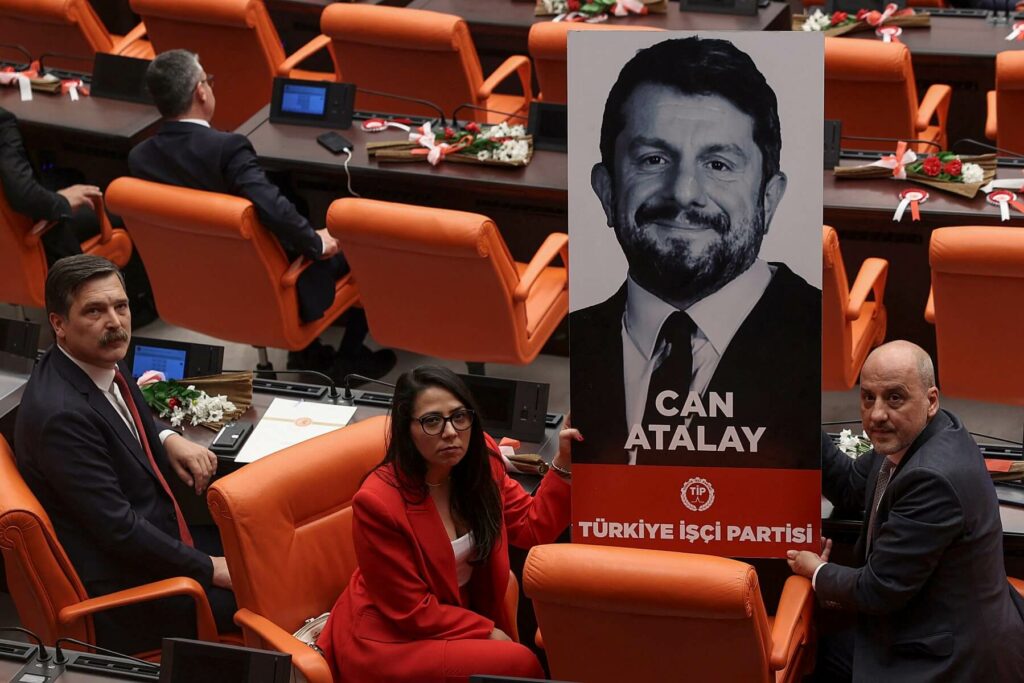The European Court of Human Rights (ECtHR) has requested a defense from Turkey in the case of Can Atalay, a jailed politician who had been ousted from the legislature despite the country’s top court finding a violation of his fundamental rights.
Atalay, who was elected to parliament in the May 2023 general election from the left-wing Workers’ Party of Turkey (TİP), is serving an 18-year sentence that was upheld by the top appeals court last year after his conviction in what’s known as the Gezi Park trial, concerning anti-government protests in 2013, labelled as a “politically motivated” trial by many.
He was not released from prison despite two Constitutional Court rulings in his favor and was stripped of his parliamentary seat earlier this year.
Atalay’s lawyers took his case to the ECtHR in April.
A statement of facts issued by the Strasbourg-based court on Monday summarizes Atalay’s case and how he was denied his parliamentary seat due to a decision from the Supreme Court of Appeals, which refused to abide by the two rulings of the Constitutional Court.
A judicial crisis erupted when the Supreme Court of Appeals, which upheld the politician’s conviction, refused to rule for his release from prison last year, defying the top court’s two decisions. In a first in the history of Turkey, the appeals court also filed criminal complaints against the members of the Constitutional Court.
In his application to the court, Atalay complained that under Article 5 of the European Convention on Human Rights (ECHR), which concerns the right to liberty and security, his continued detention was not lawful and amounted to an arbitrary deprivation of liberty as he acquired parliamentary immunity with his election as an MP on May 14, 2023.
In that connection, relying also on Article 7 of the ECHR, which concerns no punishment without law, he argued that the Supreme Court of Appeals unlawfully interpreted Articles 14 and 83 of the Turkish Constitution despite the fact that that interpretation could only be made by the Constitutional Court, and rejected his requests for release, disregarding his parliamentary immunity.
The jailed politician also claimed a violation of Article 3 of Protocol No. 1 concerning the right to free elections. The article imposes obligations on states rather than creating rights for individuals and includes the right to vote and the right of candidates to stand for election.
Atalay also complained about the violation of his rights under Article 6 of the ECHR, which concerns the right to a fair trial, Article 10 on freedom of expression and Article 11 on freedom of assembly and association as well as the prohibition on restricting ECHR rights for purposes other than those allowed under the ECHR’s Article 18.
Referring to the relevant articles of the ECHR, under which Atalay claimed having suffered a rights violation, and referring to similar ECtHR rulings on applications from Turkey, the ECtHR asked the Turkish government a number of questions including whether Atalay was deprived of his liberty in breach of Article 5 of the ECHR , taking into account the Constitutional Court’s finding of a violation on account of his continued detention following his election as an MP; whether he had at his disposal an effective procedure by which he could challenge the lawfulness of his detention, as required by Article 5 of the ECHR; whether there has been a breach of the applicant’s right under Article 3 of Protocol No. 1 to the ECHR to sit as a member of parliament once elected in free elections; and whether Atalay has exhausted domestic remedies with regard to his complaint under Article 18 of the ECHR.
The ECtHR did not say how much time Turkey has to respond to its questions.
In August an extraordinary session in the Turkish parliament called by the opposition to consider the parliamentary status of Atalay deteriorated into a brawl among ruling and opposition party lawmakers and produced no positive outcome for the politician.
The Gezi Park trial defendants including Atalay and prominent businessman Osman Kavala were convicted of attempting to overthrow the government for their alleged role in the protests, which began over an urban development plan in central İstanbul and spread to other cities in Turkey.
The youth-driven demonstrations morphed into a nationwide protest against perceived corruption by the ruling Justice and Development Party (AKP) and then-prime minister and current president Erdoğan’s growing authoritarianism.
Erdoğan’s government violently dispersed the protests and then began to crack down on its leaders.

